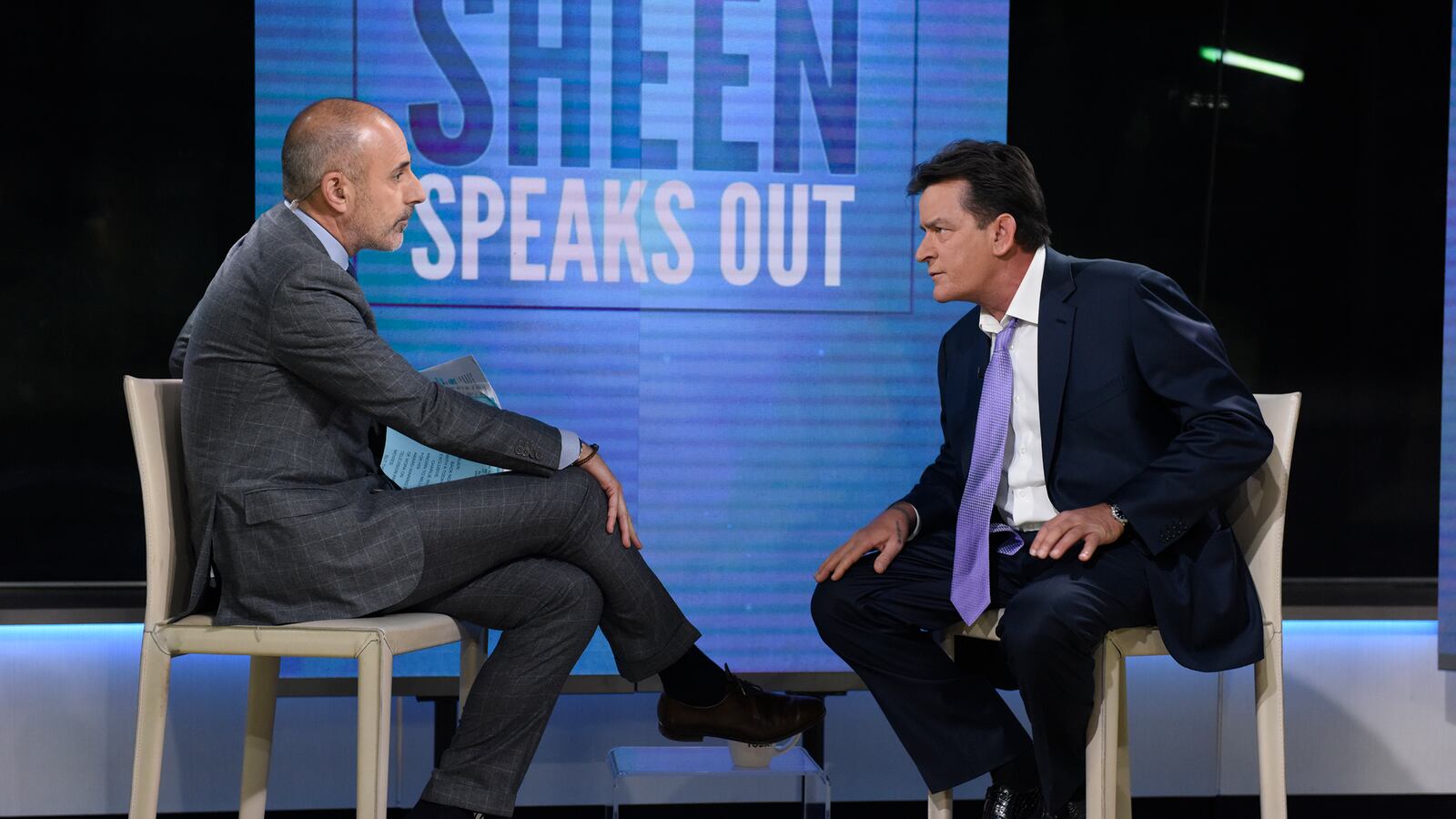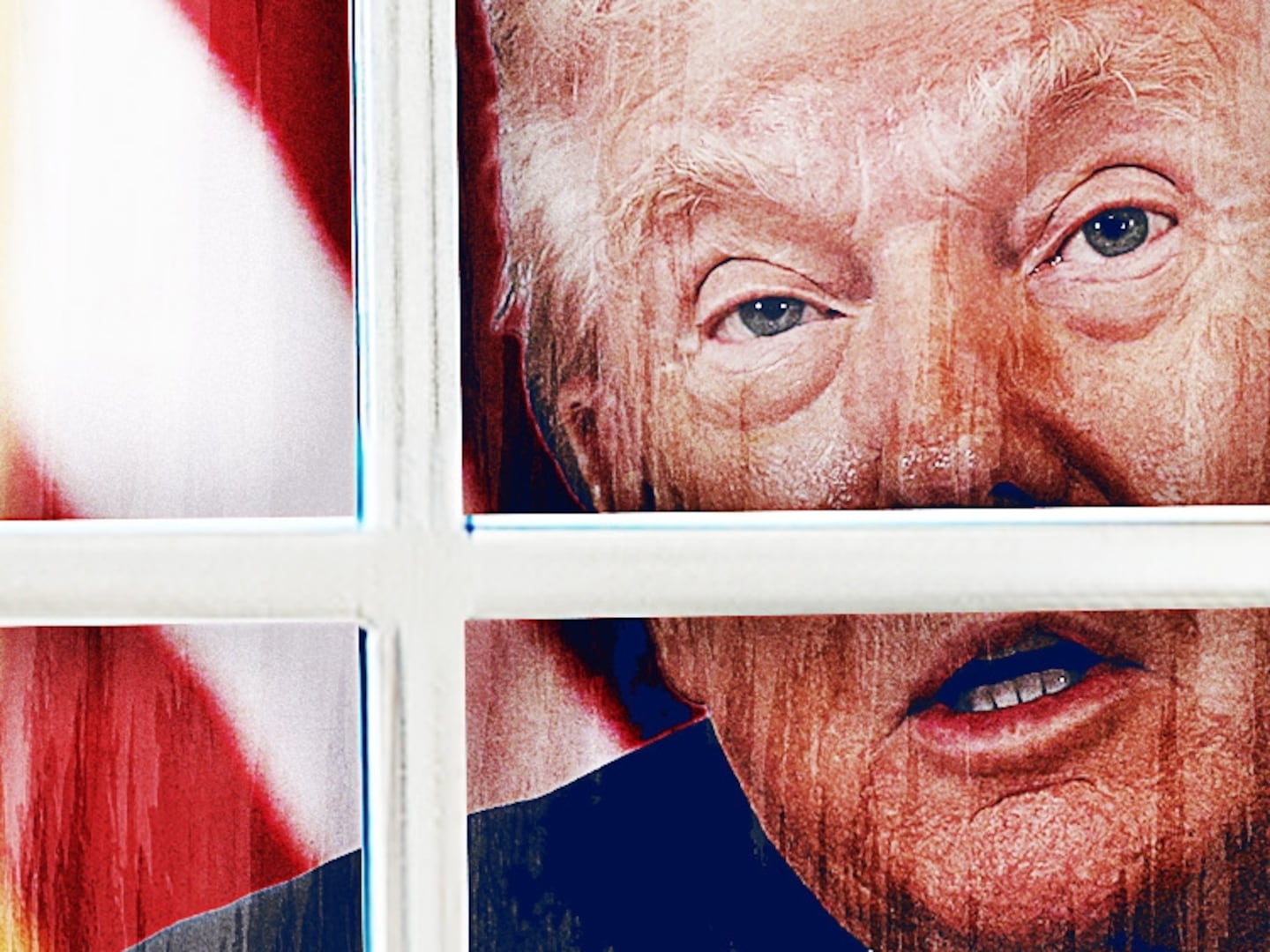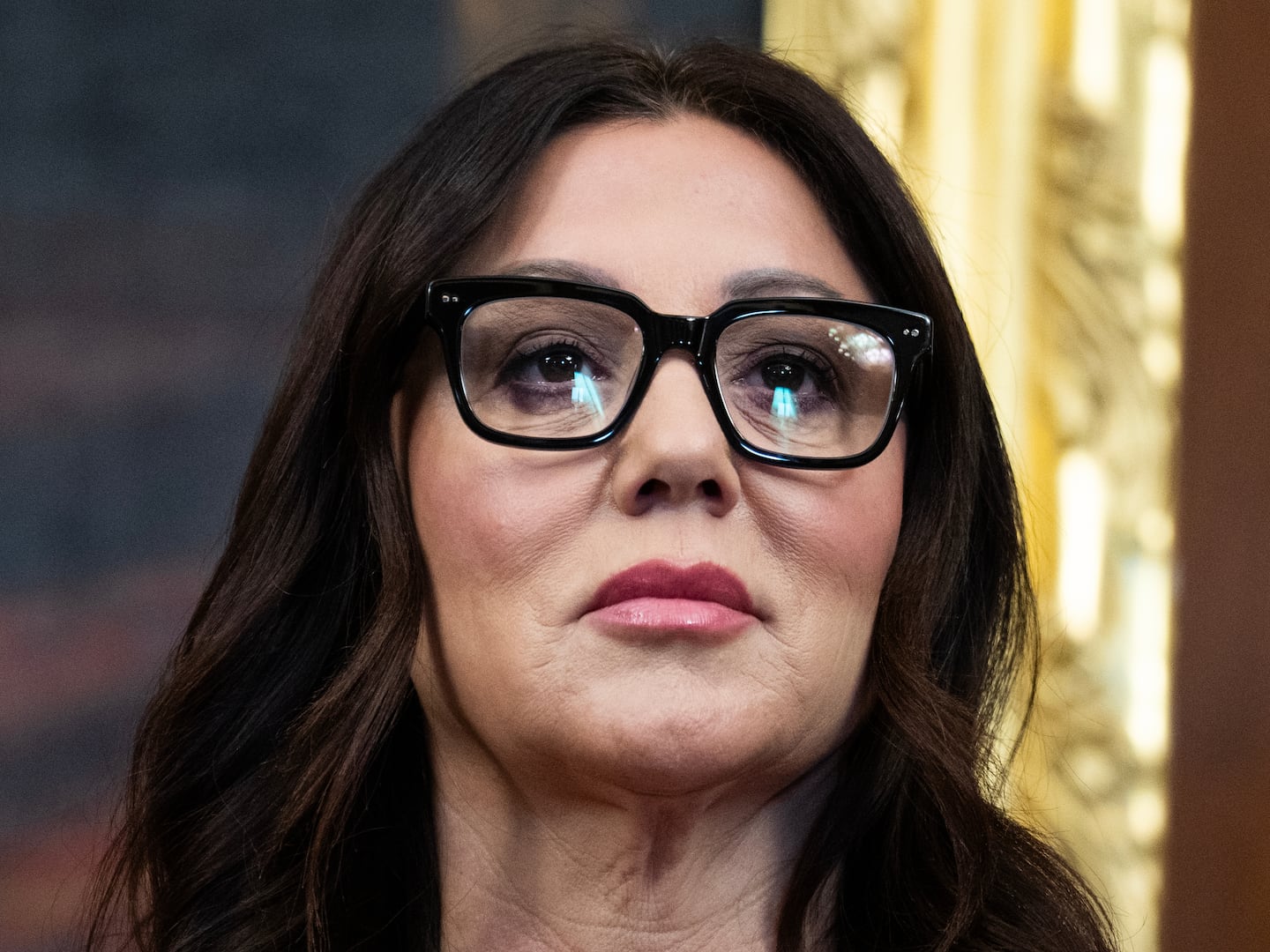Was it Matt Lauer or a very judgmental schoolmaster interviewing Charlie Sheen about his HIV diagnosis Tuesday morning on NBC’s Today? This viewer couldn’t tell.
Sheen has the kind of very public history of alcohol and substance abuse and openly non-traditional sexual behavior that, perhaps, made Lauer’s admonishing and finger-wagging suitable—at least in Lauer’s mind.
Throughout, there was a tone reminiscent of the all the pre-speculation: that Sheen deserved to be positive, given his louche and licentious ways—the drugs, the booze, the prostitutes, #winning, etc.—and that his appearance on Today was not just an admission of his HIV-positive status, but also atonement. And—like any visit to the headmaster's office—a vow not to misbehave any more.
Look into Matt’s eyes, Charlie: swear to be your better man.
The problem for Lauer, HIV advocates, and anyone else looking at this latest chapter of Sheen’s rollercoaster life is that, as Sheen himself stated, he will not be “the poster boy” for HIV—or the one the community wants. He will not say or do the right things. PR coaching can only go so far, at least with someone as innately mercurial and mischievous as Sheen.
But this, in itself, may be no bad thing: An HIV-positive public figure still visibly struggling with drinking issues, or sex issues, is a darned sight real-er than one on the more traditional path of meekly seeking an audience’s understanding on the basis of their goodness.
Indeed, Sheen’s excessive sexual behavior and other illicit tendencies of previous years led writers of articles before his on-screen admission to posit that becoming HIV positive was an inevitability.
The judginess around Charlie Sheen is, as I have written, a throwback to the ugly 1980s; it shows how little we have changed; how little a new generation who never lost loved ones against such a bleak and angry canvas of bigotry and governmental indifference understands HIV and AIDS.
The comments I keep seeing are like little shrugs of “he had it coming.” One gentleman tweeted at me that—and I don’t think he meant it to read as heartlessly as I read it—that young people had forgotten about HIV, and it would take Charlie Sheen’s diagnosis to change that.
Well, that would all be fine and dandy if Sheen was a more pliable celebrity, but it is clear that Charlie Sheen is not going to be the say-the-right-thing HIV advocate.
More brutally, would any young person listen to his counsel on the matter? HIV education among the young may be parlous, but is Sheen really the conduit for greater knowledge? Is this just another revolution of the public car-wreck of his life?
For one, his performance on Today was, if not as shambolic as the “winning” period, then a little disconnected, a little not-all-there. Maybe he was just pissed off. Maybe that’s how he speaks, but Charlie Sheen still has an air of wildness about him, even when telling the nation about his HIV diagnosis.
Certainly, Sheen had his lines down pat. He said he was there to admit to being HIV-positive and to put a “stop to this onslaught, this barrage of attacks, of sub-truths” that were “very harmful” and “threatening the health of so many others.”
His diagnosis had come four years ago, after a battery of headaches and night sweats and was a turning point in his life.
Being Charlie Sheen, things then ran off the rails in a betrayal and extortion narrative, “a circus of deceit,” in which he had given millions of dollars to “unsavory types”—prostitutes—who had come to his house, or found out his HIV secret, and started blackmailing him into buying their silence.
“Their trust turned to their treason,” he said—or Russell Brand wrote for him.
The payments would stop with the program, Sheen vowed.
This narrative was in direct contravention of the lawsuits that had reportedly been brought against Sheen by those claiming he had sex with them without disclosing his HIV status.
So, a game of he-said, they-said is about to begin.
Sheen said that he had disclosed his HIV-positive diagnosis to all his sexual partners after it had become known.
His ex-girlfriend Bree Olson told Howard Stern he hadn’t told her—they’d had sex using lambskin condoms, which prevent pregnancy, but not HIV transmission.
In the second of the Sheen segments his doctor described the level of HIV in Sheen’s blood as undetectable, thanks to the antiviral treatment he has been taking: “Charlie does not have AIDS. He is healthy.”
This segment was telling, visually. Having been spoken to as if he was an exceptionally naughty schoolboy in the first segment, in this second, Sheen just had to sit there and be a good public health example, as his diagnosis and illness was discussed by Grown Up Matt and Grown Up Doctor.
Naughty Charlie With His HIV was the patient in the bed, as we all gawped like young medical residents around him.
Lauer said HIV could still be secreted in genital fluids, and its levels fluctuated, but with “somebody conscientious,” who took their pills properly, this could all be controlled.
“Are you doing drugs?” he asked Sheen on the naughty step. Sheen said he wasn’t, but was still drinking a bit.
Grown Up Matt then went back to talking to Grown Up Doctor. Can he be trusted to take his medicine on that basis?
“We’re petrified about Charlie, so, so anxious,” said the Sensible Doctor. With or without HIV, Sheen is still being painted as an infantilized time bomb, now not only ready to go off the rails with drugs or booze or hookers, but a walking, unpredictable vector of HIV.
Grown Up Matt wondered aloud how possible it was for him not to take his pills if he was fucked up doing some other substance. The Good Doctor said, despite all Charlie’s “mayhem,” he had taken all his pills.
Shouldn’t Charlie have gotten a little gold star at this point?
“You need to stop drinking,” said Lauer, in full scolding daddy mode.
“Perhaps the freedom of today will lead to that,” said Sheen, instead—as he would have been quite within his rights to do—of punching Lauer square in the face.
Bad Charlie was reciting the script of daytime TV redemption to the letter. It may be genuine. It may be therapy talking.
He was most eloquent and furious as being configured as the person depicted in the tabloids who knew they were HIV positive “and intentionally spreading it.”
TV presenters have a new way of asking a question they are too cowardly to ask themselves: they retreat to “a question from one of our viewers on Twitter”—in this case, a gentleman who said he was sorry ’n’ all about the HIV thang, but that Sheen’s “lifestyle had left him open for something like this.” Headmaster Lauer paused for Sheen to pick up the bone.
“That’s not a completely inane or crazy statement,” he said. But he was going to ride the wave of public support, he said, and maybe even find the long-sought antidote. Of course, this is coming from the man who gave us Tiger Blood. “If there is one guy on this planet that’s going to deliver a cure, it’s me,” he said. “Seriously. Seriously.”
This will be of enormous reassurance to all the scientists who have been toiling to do the same these past 30-plus years—finally they have Sheen’s expertise and specialist knowledge at their disposal.
Lauer either heard this, and like most viewers had no way to respond immediately politely, or misunderstood Sheen, and thought he said he’d take on some kind of public role.
“I will not shun (sic) away from responsibilities and opportunities that draw me to helping others…I will pick my spots carefully,” Sheen said.
Finally, after three segments spread over 50 minutes, it was over. Sheen, in his ruffled suit combo, had done the atonement expected of him.
But in the articles before, and on the Today show itself, there seems to be less concern for him and more judgment.
The unspoken question with Matt Lauer was the same as the unstated judgment of The National Enquirer and Radar Online: “What did you expect after behaving in the way you do?”
Charlie Sheen may, indeed, have undetectable HIV levels in his blood; his challenge will be to counter the relentless shaming of his private life—the sex he’s had, the drugs and drink he’s consumed—and the neat narrative being crafted around his HIV diagnosis, which those around in the 1980s know all too well: He deserved it.
Well, Sheen didn’t. But he has it.
So, accept he’s a walking fairground of his own crazy—someone who still does things he knows he shouldn’t, who still has demons and screws up—and ask the man something else.
The questions of his sexual relationships with others and his HIV status will persist. But how long will we expect him to apologize and atone after they have been answered?
Should we want to listen, Sheen could teach us something colorful and complex about living with HIV. That’s if we can allow him to stop being the human disaster we love to watch.






